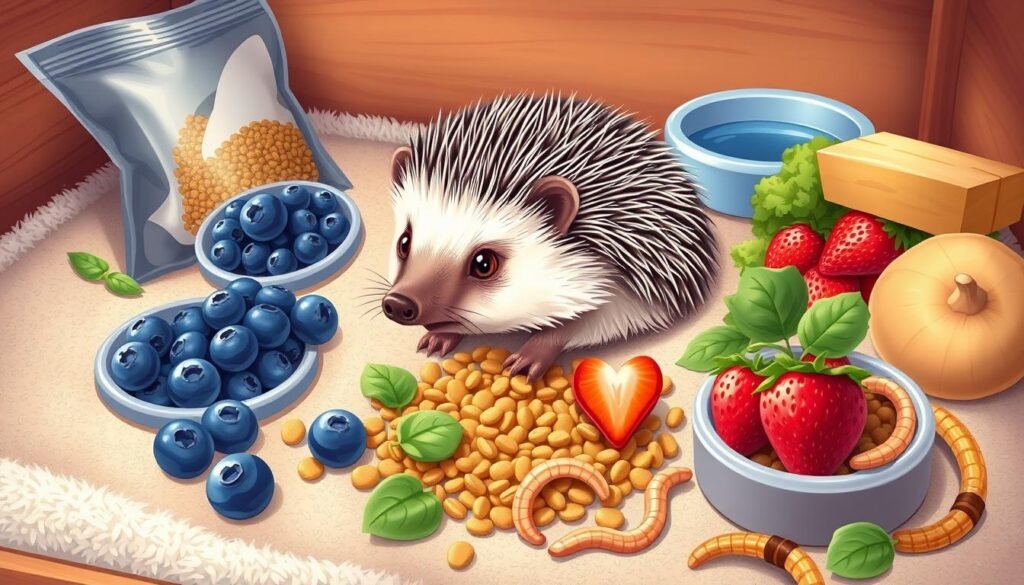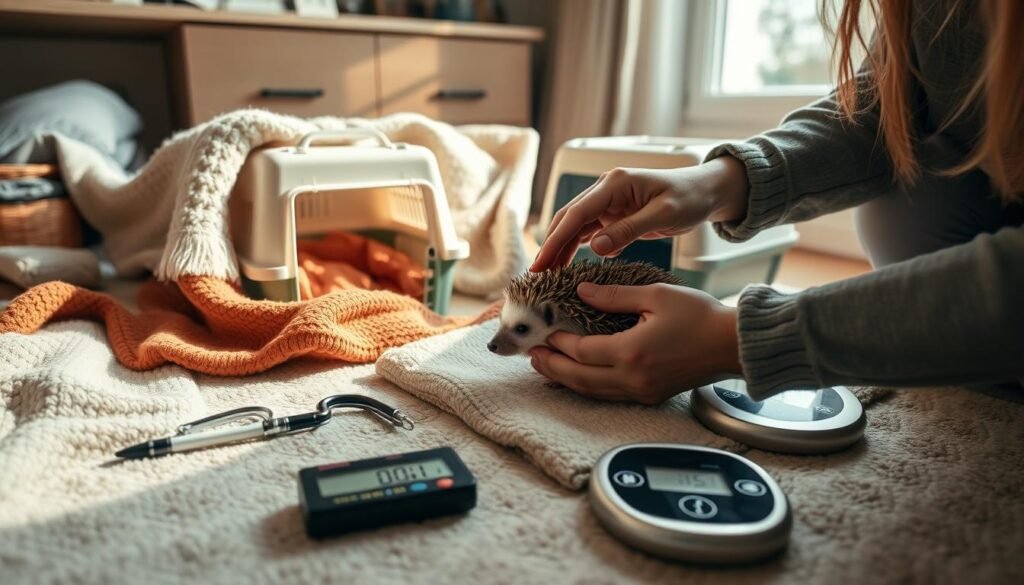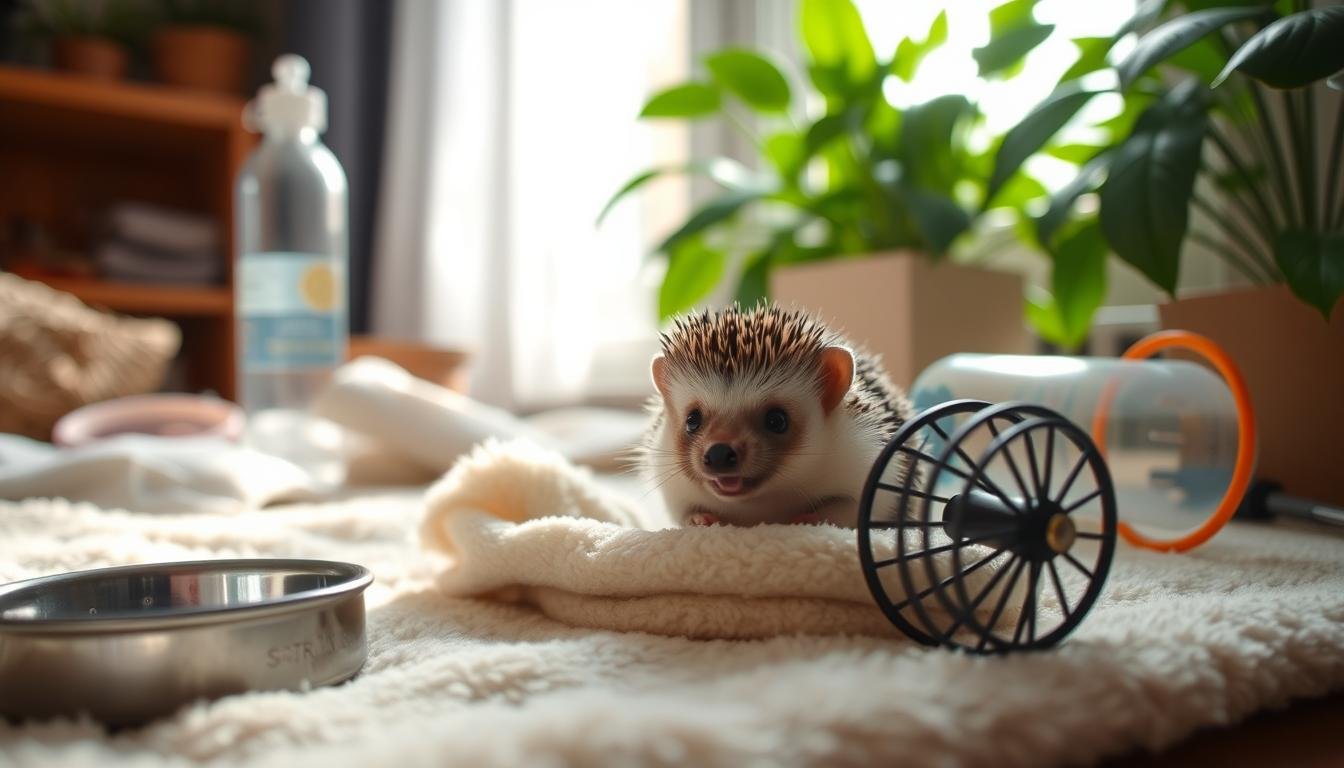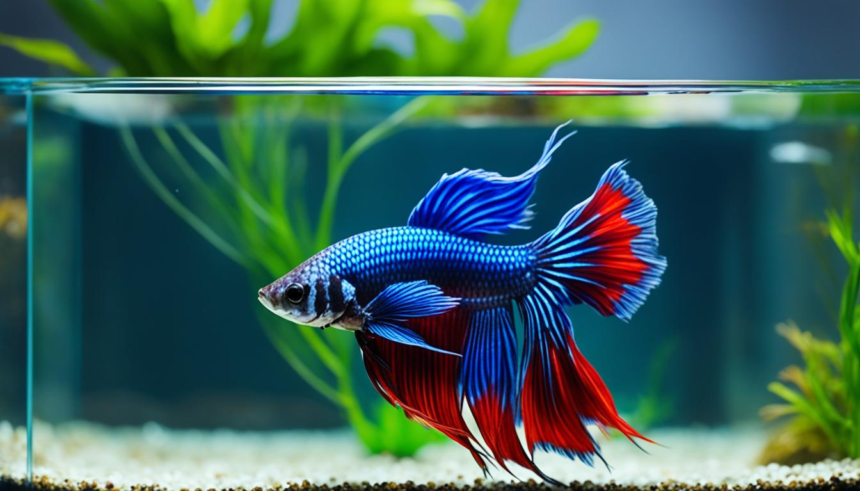More people are falling in love with hedgehogs, like the African pygmy hedgehog. There are only 17 species worldwide. They are becoming popular pets for those looking for something different.
The African pygmy hedgehog is a favorite in the U.S. They are small, quiet, and fun. This makes them great pets for those who want something unique.
Caring for hedgehogs is important. They are active at night and need the right temperature and food. Knowing how to care for them is key.
Having a hedgehog as a pet is a big responsibility. They are small and need special care. But, they can be very rewarding pets for those who are committed.
This guide will help you learn how to care for your hedgehog. We’ll talk about everything from their home to what they eat. You’ll learn how to make your hedgehog happy and healthy.
Understanding African Pygmy Hedgehogs as Pets
African pygmy hedgehogs are becoming more popular as pets. They offer a unique and engaging experience. This is different from traditional pets.
Physical Characteristics and Lifespan
The african pygmy hedgehog is small, measuring 6 to 8 inches long. They weigh between 8 to 21 ounces. These animals can live up to 10 years in captivity.
- Adult size: 6-8 inches long
- Weight range: 8-21 ounces
- Captivity lifespan: 3-6 years
- Potential maximum lifespan: 10 years
Natural Habitat and Origins
These hedgehogs come from central and eastern Africa. They are insectivores with special adaptations. Their natural environment makes them interesting pets for those who can provide the right care.
“Hedgehogs are not just pets, they’re a unique window into the fascinating world of exotic animal companionship.”
Behavioral Traits and Temperament
Hedgehogs are active at night, usually around dinnertime. They use smell and sound to navigate, as their eyesight is poor. They can be tame if adopted young, between 6-8 weeks.
| Characteristic | Description |
|---|---|
| Activity Pattern | Nocturnal |
| Sensory Navigation | Smell and Sound |
| Personality | Curious but Timid |
| Best Adoption Age | 6-8 weeks |
Important Note: Hedgehog owners need to understand these animals require special care. They may not be right for all homes, like those with young children or people with weak immune systems.
Creating the Perfect Hedgehog Housing Environment
Creating a cozy and safe home is key for your hedgehog’s well-being. A well-thought-out enclosure gives your spiny friend all they need to live happily.
Cage Size and Material Requirements
Choosing the right cage size is important. A minimum of 2 x 3 feet is recommended. This size ensures your hedgehog has enough room to move around. Also, stay away from wire-bottom cages to protect their feet.
- Minimum cage size: 2 x 3 feet (61 x 91 cm)
- Aquarium alternatives: At least 30 gallons
- Bar spacing: 1 inch (2.5 cm) or less to prevent escape
Temperature and Lighting Considerations
Hedgehogs are very sensitive to temperature changes. Keep the cage’s temperature between 72-80°F (22-27°C). Make sure it’s not too close to direct sunlight or drafty spots to avoid stress and health problems.
Essential Cage Accessories and Enrichment
A good hedgehog enclosure has several important items for comfort and fun.
| Accessory | Recommended Specifications |
|---|---|
| Exercise Wheel | 10.5-12 inches, solid surface |
| Water Container | Ceramic waterer for stability |
| Bedding | Fleece liners, aspen shavings, paper bedding |
| Hideout | Dark, cozy sleeping area |
Choose soft bedding like fleece or paper-based substrates. Avoid cedar shavings, as they’re toxic. Add a variety of safe toys for mental fun. Make sure they’re easy to clean and won’t cause choking.
Remember, a thoughtfully designed cage is more than just a living space—it’s your hedgehog’s sanctuary.
Pet Hedgehog Care: Daily Maintenance and Routines
Caring for your pet hedgehog needs a daily routine. Hedgehogs need special care to stay healthy and happy. They are nocturnal, so their care is different from other pets.
- Check and refresh water supply
- Perform spot cleaning of the cage
- Provide evening exercise time
- Monitor overall health and behavior
Hedgehogs are most active at night. So, plan your time with them for the evening or early night. Feeding should occur during their natural active hours, typically in the evening or early night.
“Consistent care is the key to a happy and healthy pet hedgehog” – Exotic Pet Veterinarians
Weekly care is also vital. These tasks include:
- Complete cage cleaning
- Replacing bedding materials
- Thoroughly cleaning exercise wheel
- Checking for any signs of health issues
African pygmy hedgehogs need a temperature of 75-85 degrees Fahrenheit. Regular health checks can stop problems like dental disease and skin issues. They can also prevent parasitic infections.
Nutritional Requirements and Feeding Guidelines
It’s important to give your pet hedgehog the right food to stay healthy and happy. A balanced diet helps them grow well and live a long life.
Commercial Hedgehog Food Options
Choosing the right food is key for your hedgehog’s health. Special hedgehog food brands have the right mix of nutrients. Mazuri is a top pick among experts.
- High-protein commercial hedgehog pellets
- Low-fat formulations
- Balanced nutritional profile
Safe Treats and Supplements
Insects are a big part of a hedgehog’s diet. Mealworms are a great protein source that’s close to their natural diet. But, treats should be given in small amounts.
- Mealworms: 1-2 per day
- Crickets: Occasional protein boost
- Small pieces of cooked egg
- Tiny portions of fresh vegetables

Feeding Schedule and Portion Control
Hedgehogs mostly eat at night. Controlling portions helps avoid obesity, a big problem for them. Usually, 3-4 teaspoons of food a day is good, depending on their size and activity.
“A balanced diet is the foundation of a healthy, happy hedgehog.” – Exotic Pet Nutrition Experts
Unlike before, cat food is not good for them anymore. Now, we focus on special foods made just for hedgehogs.
Make sure they always have fresh, clean water. Watch their weight and health to make sure they’re eating right.
Exercise and Activity Requirements
Hedgehogs are very active and need to move all the time. It’s important to understand their exercise needs for their health. Even though they are small, they have lots of energy.
The exercise wheel is key to keeping your hedgehog healthy and happy. When picking an exercise wheel, look for these important things:
- Minimum wheel diameter of 12 inches
- Solid running surface to prevent leg injuries
- Sturdy construction that can support the hedgehog’s weight
- Easy to clean and maintain
Hedgehogs are very active during nighttime hours, often running several miles equivalent in their wheel. Without enough exercise, they can get very sick, like obesity and depression.
“Regular exercise is not just a luxury for hedgehogs, it’s a necessity for their overall well-being.” – Exotic Pet Veterinarian
Besides the wheel, hedgehogs also need to explore outside their cage. Make a safe, enclosed area for them to play and discover. Good exercise activities include:
- Supervised floor time in a hedgehog-proofed room
- Interactive toys that encourage movement
- Tunnel systems for exploration
- Soft rubber balls for gentle play
Always watch your hedgehog during exercise to keep them safe and avoid injuries.
Health Monitoring and Common Medical Issues
Keeping your hedgehog healthy means watching them closely and taking them to the vet often. These little animals can face many health problems that need your attention.

It’s important to take your hedgehog to the vet regularly. This helps catch health issues early. Hedgehogs can get sick with things that affect their happiness and health.
Signs of Illness to Watch For
- Significant weight changes
- Reduced appetite or water intake
- Unusual lethargy or decreased activity
- Abnormal breathing patterns
- Excessive quill loss
- Changes in bathroom habits
Common Health Concerns
| Health Issue | Primary Symptoms | Potential Treatment |
|---|---|---|
| Internal Parasites | Diarrhea | Veterinary fecal examination |
| Quill Mites | Flaky skin, quill loss | Antiparasitic medications |
| Cancer | Weight loss, reduced appetite | Surgical intervention |
| Respiratory Disease | Nasal discharge, breathing difficulties | Antibiotics |
Preventative Care Measures
To keep your hedgehog healthy, take these steps:
- Annual vet visits
- Good diet and weight control
- Check their weight often
- Keep their home at the right temperature
- Spay or neuter to avoid health problems
When to Seek Veterinary Care
Call a vet right away if you see:
- Persistent changes in behavior
- Continuous weight loss
- Signs of neurological problems
- Visible tumors or skin issues
Seeing a vet early can really help your hedgehog’s health.
Watching your hedgehog’s health closely is key to their long, happy life.
Bonding and Handling Techniques
To handle a pet hedgehog well, you need to understand their behavior. These small animals are shy and need gentle, patient care to trust you. They use scent and sound more than sight to communicate.
- Move slowly and talk softly
- Let them get used to being handled slowly
- Wear clothes with your scent near their home
- Give them small treats while you’re together
“Patience is the most important ingredient in building a relationship with a hedgehog.” – Exotic Pet Veterinarian
Here are some good ways to handle them:
| Technique | Duration | Purpose |
|---|---|---|
| Daily Handling | 30 minutes | Build trust and comfort |
| Morning Interactions | 15-minute sessions | Align with hedgehog’s natural activity cycle |
| Scent Introduction | Continuous | Help hedgehog recognize you |
When your hedgehog is comfortable, you’ll see relaxed quills and calm breathing. They might even want to be held. But remember, every hedgehog is different, so progress can vary.
Pro Tip: Always provide a safe retreat space in their habitat to help them feel secure during bonding process.
Grooming and Hygiene Practices
Keeping your hedgehog clean is important. It helps them stay healthy and strengthens your bond. Proper grooming is key.
Bathing Your Hedgehog: Best Practices
Here are the best tips for bathing your hedgehog:
- Limit baths to once a month or when absolutely necessary
- Use warm water (about 2 inches deep)
- Select gentle, specialized wash to protect skin pH
- Consider oatmeal or coconut oil for dry skin relief
“Bathing should be a careful, gentle process that minimizes stress for your hedgehog.”
Quill and Nail Maintenance
Quills need regular care for your hedgehog’s comfort. Watch for any unusual loss or damage. Some quill shedding is normal, but too much might mean health issues.
- Trim nails every two weeks
- Cut only the white part extending past the pink quick
- Use specialized small animal nail trimmers
Dental Care Essentials
Dental care is vital for hedgehogs. Regular tooth cleaning prevents oral health problems:
- Use a small toothbrush with water
- Clean teeth gently
- Offer a treat like a worm after cleaning to make the experience positive
- Schedule regular veterinary dental check-ups
Consistent grooming practices will help keep your hedgehog healthy, clean, and happy.
Creating a Safe Play Environment
Hedgehogs love to explore and need safe play spaces. These spaces should let them roam freely while keeping them safe. It’s important to make a secure play area for your pet’s happiness and safety.
Here are some key safety tips for setting up a play area:
- Block off small spaces where hedgehogs might get stuck
- Remove electrical cords that could harm them
- Make a contained space with smooth walls
- Always watch your hedgehog during playtime
Your hedgehog’s play area should have fun things to do. Recommended play items include:
- Soft tunnels
- Small, safe toys
- Hiding spots
- Cardboard mazes
“A well-designed play environment is essential for a hedgehog’s mental and physical stimulation.”
Indoor play areas should be kept between 72°F and 80°F. Avoid drafts and direct sunlight. Use soft bedding like fleece or paper to keep them comfortable and safe.
Hedgehogs are most active at night. So, play with them in the evening. Always wash your hands after handling them to avoid salmonella.
Conclusion
Becoming a hedgehog parent is a big responsibility. It needs dedication and special knowledge. The African pygmy hedgehog is the top choice in America for pets.
These pets need specific care. This includes the right home and food. Owners must know how to keep them healthy.
Hedgehogs are small and quiet, making them great pets. But, they need special attention. Their home should be at least 4 x 2 feet and kept warm.
Being a hedgehog owner comes with challenges. They bond slowly and can get sick. Owners must watch for signs of illness and feed them right.
There are about twelve million pet hedgehogs in the US. But not all owners know how to care for them. By learning and creating a good home, you can have a great bond with these unique animals.
FAQ
Are African Pygmy Hedgehogs good pets for beginners?
African Pygmy Hedgehogs can be a challenge for new exotic pet owners. They need special care, like the right temperature and diet. They also need to be handled gently.
Before getting one, it’s important to learn about their needs. They live at night and have specific health needs.
How long do pet hedgehogs typically live?
A pet African Pygmy Hedgehog can live about 5 years. This is if they get the right care, food, and vet visits.
What type of diet do hedgehogs need?
Hedgehogs eat insects and need a diet high in protein and low in fat. They should eat commercial hedgehog food and sometimes insects like mealworms. But, they should not eat cat food.
It’s also important to watch how much they eat to avoid obesity.
Do hedgehogs require special housing?
Yes, hedgehogs need a big cage with solid floors. The temperature should be between 72-80°F (22-27°C). Their cage should have hiding spots, food, water, a wheel, and soft bedding.
Make sure the cage doesn’t have wire to prevent injuries.
How often do hedgehogs need veterinary care?
Hedgehogs need a vet visit every year. This is to check their health and catch any problems early. Watch for changes in their behavior or health.
Are hedgehogs social animals?
Hedgehogs are not social and like to be alone. They are shy and hard to handle. But, they can get used to people if handled gently and often, starting when they are young.
How much exercise do hedgehogs need?
Hedgehogs are very active and need lots of exercise. They need a big wheel to run in. Without enough exercise, they can get depressed and sick.
Do hedgehogs require bathing?
Hedgehogs don’t need to be bathed often. But, a shallow bath now and then can clean their feet. They might need their nails trimmed and their teeth brushed gently.
Can hedgehogs be handled safely?
Hedgehogs can be handled if done carefully. They are calm when their quills are flat. Move slowly and watch for signs they are stressed or comfortable.
What are common health issues in pet hedgehogs?
Health problems in hedgehogs include dental disease and parasites. They can also get tumors. Look for changes in their eating, activity, or bathroom habits. Regular vet visits are key to keeping them healthy.













